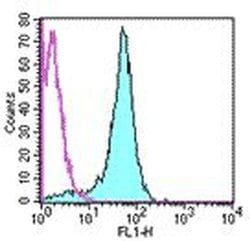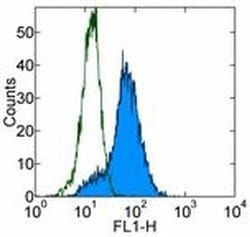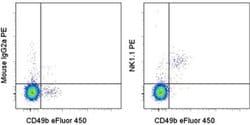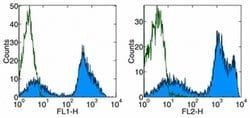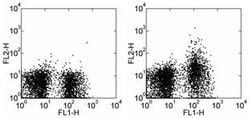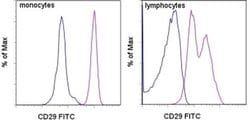7068608
CD24 Monoclonal Antibody (30-F1), FITC, eBioscience™, Invitrogen™
Rat Monoclonal Antibody
Manufacturer: Fischer Scientific
The price for this product is unavailable. Please request a quote
Antigen
CD24
Applications
Flow Cytometry
Conjugate
FITC
Regulatory Status
RUO
Isotype
IgG2c κ
Clone
30-F1
Classification
Monoclonal
Host Species
Rat
Target Species
Mouse
Primary or Secondary
Primary
Description
- Description: The 30-F1 monoclonal antibody reacts with the mouse CD24 molecule, also known as Heat Stable Antigen (HSA)
- This 35-50 kDa molecule is anchored in the plasma membrane via phosphatidylinositol and is expressed by erythrocytes, thymocytes, peripheral lymphocytes and myeloid lineage
- The expression of CD24 detected by 30-F1 has been used to resolve stages of B lymphopoiesis in mouse bone marrow
- It has been reported that P-selectin (CD62P) binds to CD24
- CD24 is a variably glycosylated molecule resulting in heterogeneity of molecular mass of this antigen on cells of different lineages and different antibodies to CD24 exhibit subtle differences in staining level on lymphocyte populations
- Applications Reported: The 30-F1 antibody has been reported for use in flow cytometric analysis
- Applications Tested: The 30-F1 antibody has been tested by flow cytometric analysis of mouse splenocytes and bone marrow cells
- This can be used at less than or equal to 1 μg per test
- A test is defined as the amount (μg) of antibody that will stain a cell sample in a final volume of 100 μL
- Cell number should be determined empirically but can range from 10^5 to 10^8 cells/test
- It is recommended that the antibody be carefully titrated for optimal performance in the assay of interest
- Excitation: 488 nm; Emission: 520 nm; Laser: Blue Laser
- Filtration: 0.2 μm post-manufacturing filtered
- CD24 is a two-chain glycosylphosphatidylinositol (GPI)-anchored glycoprotein expressed at multiple stages of B-cell development, beginning with the bone marrow pro-B-cell compartment and continuing through mature, surface Ig positive B-cells
- Plasma cell expression is very low or negative
- CD24 is also expressed on the majority of B-lineage acute lymphoblastic leukemias, B-cell CCLs and B-cell non-Hodgkin's lymphomas
- CD24 may play a role in regulation of B-cell proliferation and maturation, and control of autoimmunity.
